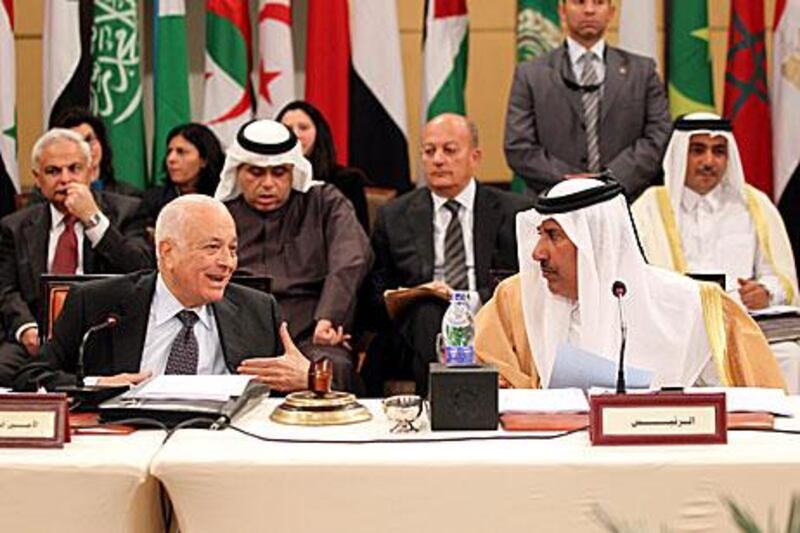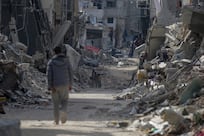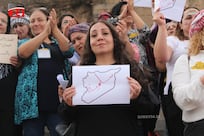CAIRO // The Arab League yesterday again demanded that the Syrian government end its violence against demonstrators and allow in more monitors as it vowed to carry on with its controversial observer mission.
After a meeting of foreign ministers in Cairo yesterday evening, the league said it had "decided to give Arab League observers the necessary time to continue their mission according to protocol".
Violence continued yesterday as activists reported that at least 10 more civilians died and clashes between government troops and military defectors killed 11 soldiers.
The Arab League also urged other armed parties to halt the bloodshed, an apparent reference to the defectors. The ministerial committee called on "the Syrian government and various armed groups to immediately halt all forms of violence and to return to protesting peacefully for the success of the Arab League observers' mission in Syria".
The message disappointed activists who want more decisive action by the league and details of the Syrian government's reported lack of cooperation with the observers. Activists say up to 450 people have been killed by the regime since observers arrived in Syria 12 days ago.
Several activists and human rights groups have described the mission as a failure because of the continued violence and the government's refusal to adhere to the Arab League's demands for troops to pull out of cities and release political prisoners. The Free Syrian Army, the armed rebel opposition to the regime of President Bashar Al Assad, has warned it would end a ceasefire and strike back at the regime if the government's crackdown did not cease.
The Arab League said yesterday that it would reveal more detailed findings of its observer mission on January 19. It also said it would increase the number of monitors in Syria and ask the United Nations Secretary General about "technical" support for the one-month mission.
Syrian authorities have been at pains to prevent international intervention, with officials convinced they will outlast the protesters and retain power as long as no outside military force enters the picture.
Making sure the Security Council does not get involved has been a key plank of that strategy, helped by Moscow, which has blocked efforts by Syria's western critics to raise the issue at that level.
Access for the monitors - granted belatedly on Russian advice - appears to have been given with this in mind. Syrian officials have made it clear they believe the observers will back their claims to be fighting an Islamist insurgency, not merely using deadly force to suppress a largely peaceful call for greater political freedoms.
There has been an increasing militarisation of the uprising since it began in March, with rebel soldiers and civilians picking up weapons to fight security forces, particularly in Deraa, Idleb and Homs but also on the outskirts of the capital. Syrian officials say some 2,000 security personnel have been killed.
Opposition activists have been highly critical of the Arab League mission, saying it has failed to stop the bloodshed.
Despite their misgivings, protesters have turned out in large numbers to meet the observers and make their case.
They have also accused the Syrian authorities of a dirty-tricks campaign: taking monitors to the wrong neighbourhoods, moving prisoners to off-limits military compounds and dressing soldiers in police or civilian clothes to give the false impression that troops have been pulled out of urban centres.
Under the terms of a November 2 agreement between Syria and the Arab League, Damascus is supposed to have pulled all military forces out of urban zones, released all political prisoners and halted violence against demonstrations.
Its failure to meet those requirements resulted in suspension from the Arab League and the imposition of sanctions.
The monitors have the task of checking Syrian compliance with the November deal, as a way of defusing the violence and bringing about a political solution to a crisis that has lasted 10 months and that risks pushing the country into a civil war.
The Syrian government has maintained it is co-operating fully with the 165 observers, and calls comments from the US State Department that it was not respecting its commitment to the observers "clear evidence on
Washington's hostile intentions against Syria in terms of targeting its security and stability", according to the Sana, the state-run news agency.
One of the major concerns about the Arab League monitoring mission is that it came too late to steer Syria away from a worsening crisis.
Protesters had already passed the point of no return after months of brutality and there was little indication that the authorities were ready to cease fire and seek political conciliation.
Instead, polarisation between pro-and anti-regime blocs has only deepened in the weeks since the monitors arrived, tensions pushed further by a series of bombings in Damascus that supporters of Mr Al Assad have blamed on the opposition.
The Syrian government has sought to portray two massive suicide bombings in Damascus in the last two weeks as attacks by extremist, anti-regime groups bent on pulling the country into chaos.
Few details have emerged about the explosions, but the government said an attack on Friday killed 25 people - mostly police officers inside a bus - and an earlier attack on the country's intelligence agencies killed 44 people. Scores more were injured. The opposition has questioned the veracity of the government's claims of terrorism, suggesting the regime could have been responsible for the explosions to shift international opinion on the uprising. But no evidence has emerged to prove any role of the government and officials have denied foul play.
As the Arab League meeting was under way yesterday, activists in Syria were reporting raids on homes and sniper attacks that killed civilians, mostly in Homs, but also in the province of Deir Ezzor and on the outskirts of
Damascus, according to the Local Coordination Committees, a network of grassroots dissidents.
bhope@thenational.ae
psands@thenational.ae
* With additional reports from the Associated Press





